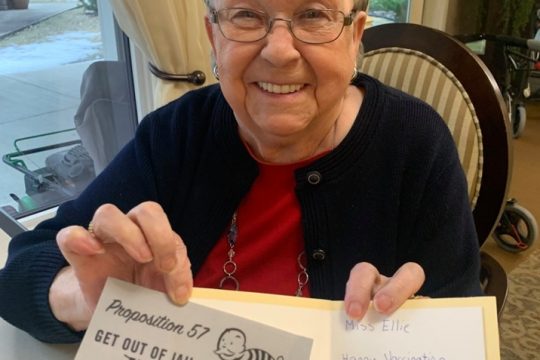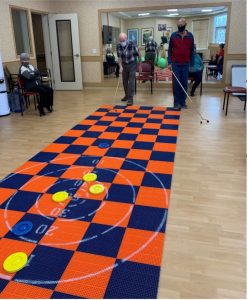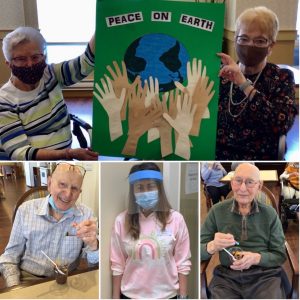
Seniors around Canada are rejoicing!
With the gradual easing of lockdown comes longed-for opportunities – to see friends, play cards, meet new grandchildren for the first time, or resume contact with family in ‘real time’.
Despite the excitement of re-engaging with activities that they value, some older people — and those at higher risk for complications from COVID-19 — may need some additional support during this time of transition.
With that in mind, here are some mental health tips on how to cope and re-engage on your own terms.
Acknowledge your feelings.
Tell your troubles to a Guatemalan worry doll, place it beneath your pillow and, according to legend, those worries will be gone by morning. That’s just one example of the culture-spanning idea that putting fear into words can blunt their emotional impact.
Modern brain scanning techniques now back up the legend: Unacknowledged fear tends to compound anxiety until it grows large and amorphous. Pinpointing and naming the specific anxiety, will help lesson its intensity because you have acknowledged it.
Try saying, “I am afraid of [fill in the blank] , and feeling _______.” Continue to name your worry thoughts every time they march into your awareness a watch their intensity begin to thaw.
Focus on what you can control. 
Trying to control or change what isn’t within your control will only drain your energy. Indeed, the more we focus on things outside of our control, the more likely we are to feel anxiety, anger, and disappointment. Since anxiety is often fueled by the unknown – and there are a lot of unknowns at the moment, focusing on what you can control may be empowering.
Set boundaries.
Let others know what you’re comfortable with so that they’ll be prepared and hopefully won’t pressure you into doing anything that makes you feel uneasy.
Explain that you’re still wearing masks and keeping distance and would appreciate if they did, too. Remember you can always say no if you think the person isn’t going to take your cautiousness seriously.
Go at your own pace.
There is no need to rush. Take things one step at a time, as you ease back into socialising – you can build your time back up as your confidence returns.
Watch for signs of anxiety.
Feeling anxious or nervous is a common emotion for people of all ages and a normal reaction to change. Being aware of how anxiety feels in your body helps you with naming (also called mental noting). It can also help you, or your loved one, recognize when the anxiety is becoming unmanageable. Signs and symptoms of anxiety in the elderly are:
- Shakiness and panicky feeling.
- Difficulty breathing, sweating, and nausea.
- Dizziness or feeling lightheaded.
- Digestion problems and chest pain.
- Headaches and confusion.
- Eye and vision problems.
- Muscle tension, soreness, and fatigue.
- Irrational thoughts.
Make time to relax.
Being able to see more of friends and family, and visit places that have been closed, is exciting. But it can also be overwhelming all at once, so it’s important to find regular time for yourself to relax. Whether you love to read, sit in nature, or savour a cup of tea, seeking ways to de-stress can improve both your physical and mental health and allow you to enjoy your time re-engaging more fully.
Practice being in the present moment.
The act of mindfulness, bringing non-judgmental attention to, and awareness of, the present moment, can help reduce anxiety. For some, this may include meditation, therapy, prayer, or journaling. For other seniors, music, an audio book, or even a quiet bath can help provide an anchor.
Learn more about meditation for seniors.
Engage in fulfilling activities.
Doing something you find fulfilling, even for just a few minutes a day, can help improve your emotional health. As we get older, we find it harder to get out of our comfort zones and engage in new, fun activities. But expanding your leisure interests is not only calming, it also helps you to manage stressors and build happiness.
Here are some of the best exercises for seniors.
Monitor Information Intake.
The elderly are more susceptible to scams and false news about COVID-19. False news reports with unsubstantiated information can also cause stress and anxiety in older adults. Stick to well-known news sources for updates on COVID-19.
With more seniors using technology, scams are also on the rise. Find out more about financial scams to watch out for.
Retirement Communities Help Ease Anxiety as Life Gets Back to Normal
The sense of community, solidarity in the face of adversity, and connection to others living in retirement homes was strengthened during the pandemic. Residents and staff supported one another every day, offering encouragement and reassurance.
Throughout the pandemic All Seniors Care has focussed on the physical and mental well-being of our residents. With weekly mental health tips through our Mindful Monday series, activity booklets, hallway exercises, and outdoor activities whenever possible, seniors reported feeling safe and supported.
Seniors at Preston Park II Retirement Residence in Saskatoon, SK even got familiar with technology while stuck inside during the COVID-19 pandemic, proving to the world that you’re never to old – or isolated – to have fun!
Now that restrictions are easing in retirement homes around the country, the built-in support is helping seniors cope with apprehension about re-entry. Each of our senior housing communities is located close to essential services, meaning that seniors have everything they need within walking distance. To find out more about our senior apartments, click here and explore the amenities we offer. And don’t forget to check our blog weekly for more Senior Living Advice.
Writer: Julianna McLeod
